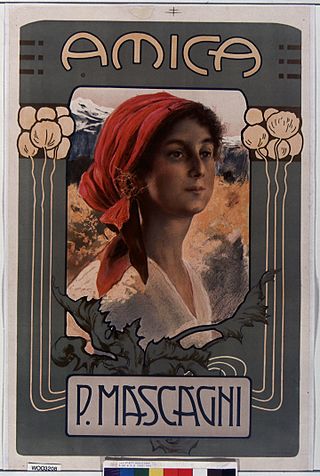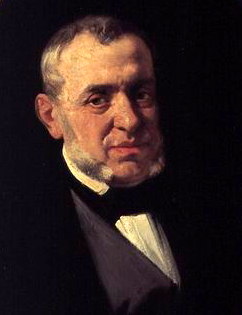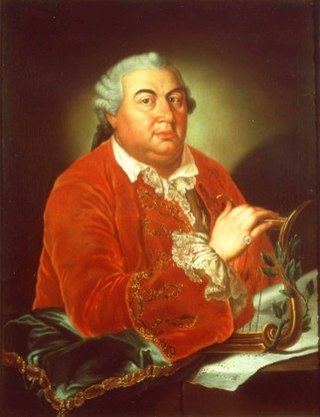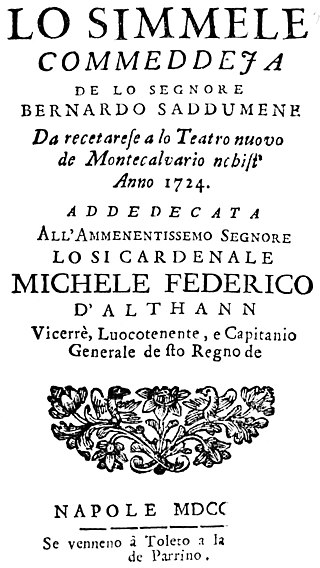
Leonardo Vinci was an Italian composer known chiefly for his 40 or so operas; comparatively little of his work in other genres survives. A central proponent of the Neapolitan School of opera, his influence on subsequent opera composers such as Johann Adolph Hasse and Giovanni Battista Pergolesi was considerable.

Farnace is an opera by Italian composer Antonio Vivaldi, set to a libretto by Antonio Maria Lucchini initially set by Leonardo Vinci during 1724. Vivaldi's setting received its first performance in 1727 at the Teatro Sant'Angelo in Venice. Popular at the time, and revived with great success at the Sporck theater in Prague in 1730, Vivaldi's Farnace slipped into oblivion until the last quarter of the 20th century when it emerged from obscurity.

Alessandro nelle Indie is an opera seria in two acts by Giovanni Pacini to a libretto by Andrea Leone Tottola and Giovanni Schmidt, based on Alessandro nell'Indie by Pietro Metastasio. It was premiered at the Teatro di San Carlo in Naples on 29 September 1824, and had a total of 38 performances in its first season.

Amica is an opera in two acts by Pietro Mascagni, originally composed to a libretto by Paul Bérel. The only opera by Mascagni with a French libretto, it was an immediate success with both the audience and the critics on its opening night at the Théâtre du Casino in Monte-Carlo on 16 March 1905. Mascagni himself conducted the performance. The opera had its Italian premiere on 13 May 1905 at the Teatro Costanzi in Rome.

Orazi e Curiazi is an opera by the Italian composer Saverio Mercadante. It takes the form of a tragedia lirica in three acts. The libretto, by Salvadore Cammarano, is based on the Roman legend of the fight between Horatii and Curiatii. It was first performed at the Teatro San Carlo, Naples, on 10 November 1846.
Gennaro Astarita was an Italian composer, mainly of operas. The place of his birth is unknown, although he was active in Naples for many years. He began his operatic career in 1765, collaborating with Niccolò Piccinni in the writing of the opera L'orfana insidiata. He became the maestro di cappella in Naples in 1770.

Ifigenia in Tauride is an opera in three acts by Niccolò Jommelli set to a libretto by the Mannheim court poet Mattia Verazi. It premiered on 30 May 1771 at the Teatro di San Carlo in Naples to celebrate the name day of Ferdinand I of the Two Sicilies. The story is based on Iphigenia in Tauris by Euripides.

Medea is an opera in three acts composed by Giovanni Pacini to a libretto by Benedetto Castiglia. It premiered on 28 November 1843 at the Teatro Carolino in Palermo, conducted by the composer with Geltrude Bortolotti in the title role. The libretto is based on the plays Medea by Euripides and Médée by Pierre Corneille.
La Lodoiska is an opera in three acts by Simon Mayr to an Italian libretto by Francesco Gonella De Ferrari. It was Mayr's second opera and premiered at La Fenice in Venice on 26 January 1796.

Didone abbandonata was an opera in three acts composed by Tomaso Albinoni. Albinoni's music was set to Pietro Metastasio's libretto, Didone abbandonata, which was in turn based on the story of Dido and Aeneas from the fourth book of Virgil's Aeneid. The opera premiered on 26 December 1724 at the Teatro San Cassiano in Venice and was the first time that an opera based on a Metastasio libretto was performed in Venice.

Didone abbandonata is an opera in three acts composed by Domenico Sarro to a libretto by Pietro Metastasio of the same name which was based on the story of Dido and Aeneas from the fourth book of Virgil's Aeneid. The opera premiered on 1 February 1724 at the Teatro San Bartolomeo in Naples.

Semiramide riconosciuta is an Italian opera with serious action, or dramma per musica, by Nicola Porpora, set to a libretto by Metastasio with some textual changes, possibly by Domenico Lalli. The opera was written for some of the finest contemporary singers, and includes a technically demanding series of da capo arias.

Il prigionier superbo is an opera seria in three acts, composed by Giovanni Battista Pergolesi to a libretto attributed to Gennaro Antonio Federico, and based on an earlier libretto by Francesco Silvani for Gasparini's opera, La fede tradita e vendicata. It was premiered at the Teatro San Bartolomeo in Naples on 5 September 1733 and received further performances in October. The opera, with its labyrinthine plot involving the rivalry of Metalce and Viridate for the hand of Rosmene, soon sank into oblivion, but its comic intermezzo, La serva padrona was to achieve considerable success when performed on its own.

Carlo Scalzi was an Italian castrato who had an active performance career in major opera houses in Italy from 1718-1738. He was also heard in London in 1733–1734 where he notably created the role of Alceste in the world premiere of George Frideric Handel's Arianna in Creta. The librettist Pietro Metastasio described Scalzi as a "very unique (sic) singer" and likened his voice to that of the famous castrato Farinelli.

Salvator Rosa is an opera seria in four acts composed by Antônio Carlos Gomes to a libretto in Italian by Antonio Ghislanzoni. It premiered at the Teatro Carlo Felice in Genoa on 21 March 1874. The plot is based on Eugène de Mirecourt's 1851 adventure novel, Masaniello, in turn loosely based on the lives of the Italian painter and poet, Salvator Rosa and Masaniello, a Neapolitan fisherman, who became leader of the 1647 revolt against the Spanish Habsburg rule in Naples.

Conchita is an opera in four acts and six scenes by composer Riccardo Zandonai. The work uses an Italian language libretto by Maurizio Vaucaire and Carlo Zangarini which is based on Pierre Louÿs's 1898 novel La Femme et le pantin. The work premièred in Milan at the Teatro dal Verme on 14 October 1911 with soprano Tarquinia Tarquini, who later married Zandonai in 1917, in the title role. Her portrayal was lauded by critics and she went on to perform Conchita at the Royal Opera, London (1912), the Cort Theatre in San Francisco (1912), the Philharmonic Auditorium in Hollywood (1912), the Heilig Theatre in Portland (1912), the Metropolitan Opera House in Philadelphia (1912), the Chicago Grand Opera Company (1913), and the Teatro di San Carlo in Naples (1913). The opera was published by G. Ricordi & Co in 1912.

Siroe, or Siroe re di Persia, is an opera seria in three acts by Johann Adolph Hasse. The libretto was by Metastasio. As with many of the latter's libretti, Siroe was also set by Hasse's contemporaries, for example Vinci, Vivaldi and Handel.
Calisto Bassi was an Italian opera librettist.

Antonio Orefice was an Italian opera composer active in Naples. His Patrò Calienno de la Costa was the first opera buffa in Neapolitan dialect to be performed on a public stage.















